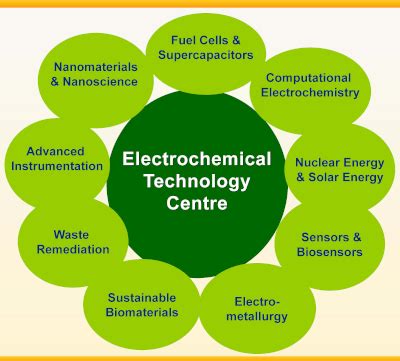Electrochemistry, a branch of chemistry that deals with the relationship between chemical energy and electrical energy, has numerous applications in our daily lives. From the production of energy storage devices to the development of new materials, electrochemistry plays a vital role in various industries. In this article, we will explore 7 key applications of electrochemistry.

Energy Storage Devices
One of the most significant applications of electrochemistry is in the production of energy storage devices such as batteries and supercapacitors. These devices are used to store electrical energy, which can be used to power various devices and machines. Electrochemistry plays a crucial role in the development of these devices, as it helps to understand the chemical reactions that occur within them.
Types of Energy Storage Devices
- Batteries: Batteries are devices that store electrical energy in the form of chemical energy. They consist of two electrodes, an anode and a cathode, separated by an electrolyte.
- Supercapacitors: Supercapacitors are devices that store electrical energy through electrostatic double-layer capacitance and electrochemical pseudocapacitance.

Electroplating
Electroplating is another significant application of electrochemistry. It is a process in which a thin layer of metal is deposited onto the surface of another metal using electrochemical reactions. Electroplating is used to produce a wide range of products, including jewelry, cutlery, and automotive parts.
Types of Electroplating
- Nickel plating: Nickel plating is a type of electroplating that involves the deposition of nickel onto the surface of another metal.
- Chrome plating: Chrome plating is a type of electroplating that involves the deposition of chromium onto the surface of another metal.
- Gold plating: Gold plating is a type of electroplating that involves the deposition of gold onto the surface of another metal.

Corrosion Protection
Corrosion protection is an essential application of electrochemistry. Corrosion is the process of deterioration of materials, usually metals, due to chemical reactions with their environment. Electrochemistry helps to understand the chemical reactions that occur during corrosion, which can be used to develop methods to prevent or control corrosion.
Methods of Corrosion Protection
- Cathodic protection: Cathodic protection is a method of corrosion protection that involves the application of an electric current to a metal surface to drive the chemical reaction in the opposite direction.
- Anodic protection: Anodic protection is a method of corrosion protection that involves the application of an electric current to a metal surface to drive the chemical reaction in the same direction.

Sensors and Detectors
Electrochemistry is used in the development of sensors and detectors, which are devices that detect changes in their environment. These devices are used in a wide range of applications, including medical diagnosis, environmental monitoring, and industrial process control.
Types of Sensors and Detectors
- pH sensors: pH sensors are devices that detect changes in the pH of a solution.
- Oxygen sensors: Oxygen sensors are devices that detect changes in the concentration of oxygen in a solution.
- Biosensors: Biosensors are devices that detect changes in the concentration of biomolecules in a solution.

Fuel Cells
Fuel cells are devices that convert chemical energy into electrical energy through electrochemical reactions. They are used as a source of power for a wide range of applications, including transportation, stationary power generation, and portable electronics.
Types of Fuel Cells
- Proton exchange membrane (PEM) fuel cells: PEM fuel cells are a type of fuel cell that uses a proton exchange membrane as the electrolyte.
- Solid oxide fuel cells: Solid oxide fuel cells are a type of fuel cell that uses a solid oxide material as the electrolyte.
- Alkaline fuel cells: Alkaline fuel cells are a type of fuel cell that uses an alkaline solution as the electrolyte.

Electrolysis
Electrolysis is the process of using electricity to drive chemical reactions. It is used in a wide range of applications, including the production of chemicals, the purification of water, and the extraction of metals.
Types of Electrolysis
- Chlor-alkali process: The chlor-alkali process is a type of electrolysis that involves the production of chlorine and sodium hydroxide from sodium chloride.
- Electrolytic refining: Electrolytic refining is a type of electrolysis that involves the purification of metals through the electrolysis of a solution.
- Water electrolysis: Water electrolysis is a type of electrolysis that involves the production of hydrogen and oxygen from water.

Medical Applications
Electrochemistry has a wide range of medical applications, including the development of medical devices, the diagnosis of diseases, and the treatment of medical conditions.
Types of Medical Applications
- Pacemakers: Pacemakers are medical devices that use electrochemistry to regulate the heartbeat.
- Defibrillators: Defibrillators are medical devices that use electrochemistry to restore a normal heartbeat.
- Biosensors: Biosensors are medical devices that use electrochemistry to detect changes in the concentration of biomolecules in the body.

Gallery of Electrochemistry Applications






FAQs
What is electrochemistry?
+Electrochemistry is the study of the relationship between chemical energy and electrical energy.
What are some applications of electrochemistry?
+Electrochemistry has a wide range of applications, including energy storage devices, electroplating, corrosion protection, sensors and detectors, fuel cells, electrolysis, and medical applications.
How does electrochemistry work?
+Electrochemistry involves the study of chemical reactions that occur at the interface between an electrode and an electrolyte.
In conclusion, electrochemistry has a wide range of applications that impact our daily lives. From energy storage devices to medical applications, electrochemistry plays a vital role in various industries. Understanding the principles of electrochemistry is essential for the development of new technologies and the improvement of existing ones. We hope this article has provided you with a comprehensive overview of the key applications of electrochemistry.
